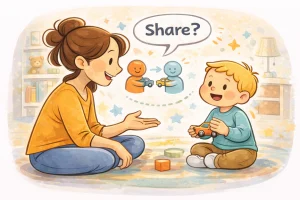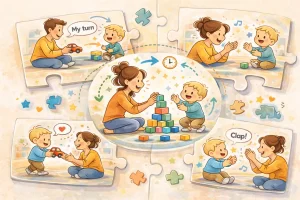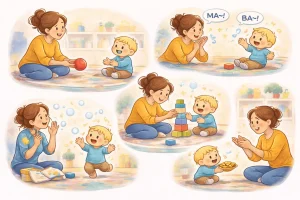My Preschooler’s Speech Isn’t Clear — When Should I Be Concerned?
Last Updated: September 5, 2025
As a parent, you probably celebrate every new word your preschooler says — but sometimes, those words may sound unclear, mumbled, or hard for others to understand. By age 3 to 5, most children reach key speech milestones, making their speech clear enough for both family and strangers to follow. But what if your child is not speaking clearly or their speech isn’t clear to teachers and friends? Should you wait and see, or is it time to be concerned?
This guide will help you understand why preschoolers’ speech may not be clear, the normal age-based expectations, and the red flags that signal a possible speech delay or articulation problem. We’ll also share practical tips to improve speech clarity at home and explain when to seek help from a speech therapist.
Free Speech Help for Kids
Concerned about speech delays? Book a free consultation with our expert speech therapist and get guidance tailored to your child’s needs.
Understanding Preschool Speech Milestones (Ages 3–5)
How clear should a 3-year-old’s speech be?
By age 3, most children can put together short sentences and use basic grammar. However, their speech is not always completely clear, especially to people outside the family. On average, a 3-year-old’s speech should be understood about 50–75% of the time. Parents often understand their child more easily because they are familiar with their speech patterns, while strangers may find it harder. Occasional mispronunciations or “baby talk” sounds are normal at this age.
How clear should a 4-year-old’s speech be?
At age 4, children usually show big improvements in speech clarity. A 4-year-old’s speech should be understood about 75–90% of the time, even by people who don’t know the child. While they may still struggle with tricky sounds like “r,” “th,” or “l,” most of what they say should make sense. If your 4-year-old’s speech is unclear to teachers, relatives, or peers, this may be a sign to check for articulation problems or possible speech sound disorders.
Typical speech milestones and speech intelligibility norms
Between ages 3 and 5, preschoolers go through rapid growth in language. They:
- Use longer sentences with 5–6 words by age 4
- Ask lots of “what,” “where,” and “why” questions
- Can tell simple stories by age 5
- Are generally understood by others most of the time
Experts often refer to speech intelligibility norms when evaluating clarity. By age 3, a child should be understood at least half the time, and by age 4, most of the time. By 5 years old, a child’s speech should be 90–100% intelligible to unfamiliar listeners.
If your preschooler is consistently hard to understand or not meeting these speech milestones, it may point to a speech delay, articulation difficulty, or phonological disorder. Recognizing these red flags early allows for timely speech therapy and support — giving your child the tools to communicate with confidence.
Why Is My Child’s Speech Not Clear? Common Causes
It can be worrying when your preschooler’s speech is hard to follow. While some unclear speech is a normal part of learning, certain factors can make it harder for children to develop clear pronunciation. Here are the most common causes parents should know about:
Articulation problems in children
Articulation problems happen when a child has difficulty making specific sounds correctly. For example, they may say “tat” instead of “cat” or “wabbit” instead of “rabbit.” These errors are quite common in preschoolers, but if they continue past the expected age, they can interfere with speech clarity. Many children with articulation issues benefit from simple practice and speech therapy for kids that targets sound production.
Phonological processes and speech sound disorders
Young children often simplify words while learning to talk — this is called a phonological process. For instance, they may drop the last sound (“ca” for “cat”) or replace hard sounds (“tat” for “cat”). While these patterns are normal up to a certain age, if they continue, they may signal a speech sound disorder. Early identification and support from a speech-language pathologist (SLP) can prevent these habits from becoming long-term barriers to clear communication.
Childhood apraxia of speech (CAS)
CAS is a motor-planning disorder where the brain struggles to coordinate the movements needed for speech. Children with apraxia may know what they want to say, but their speech sounds inconsistent, choppy, or very hard to understand. Unlike simple mispronunciations, CAS requires more intensive, specialized therapy — often with frequent, repetitive practice led by an SLP.
Hearing issues (e.g., ear infections, otitis media)
Clear speech depends on being able to hear sounds accurately. Repeated ear infections or untreated hearing loss can make it difficult for a child to pick up and reproduce speech sounds. If your preschooler often has earaches, fluid in the ears, or doesn’t respond well to soft sounds, a hearing check is an important step before assuming it’s only a speech problem.
Oral-motor or tongue-tie difficulties
Some children have structural or muscle-related issues that affect speech. A tongue-tie (where the tissue under the tongue is too tight) can restrict movement and limit sound production. Oral-motor difficulties, like weak muscles in the lips or tongue, may also reduce clarity. These conditions can usually be evaluated by a pediatrician, dentist, or SLP, who may recommend therapy or minor procedures if needed.
Know more: Oral Motor Exercises to Boost Speech & Clarity Fast
Impact of bilingualism or screen time
Parents often wonder if raising a child with more than one language can cause unclear speech. Bilingual children might mix sounds or words at first, but this is typically temporary and not a disorder. In fact, bilingualism offers long-term benefits for brain development. On the other hand, excessive screen time without enough face-to-face conversation may delay speech clarity, since children learn best from real-life interaction and modeling.
When to Worry About Speech Clarity in Preschoolers
It’s natural for preschoolers to make speech mistakes — after all, their language skills are still developing. But how do you know when unclear speech is simply part of the process and when it could signal something more serious? Understanding the difference can help you decide whether to wait, support at home, or seek professional help.
Signs of speech delay vs unclear pronunciation
Many children mispronounce tricky sounds like “r,” “l,” or “th.” This type of unclear pronunciation is normal and often improves with time. However, a speech delay is different. A delay may include:
- Not speaking in short sentences by age 3–4
- Speech that is difficult for both family and strangers to understand
- Limited vocabulary compared to peers
- Trouble following simple instructions
If your child shows these broader challenges along with unclear speech, it may be more than just mispronunciation.
When unclear speech is just developmental vs a red flag
Some sound substitutions or dropped endings are expected in preschool years and usually resolve as a child’s brain and mouth muscles mature. For example, saying “tat” for “cat” at age 3 is typical. But if your 4-year-old’s speech is unclear to teachers, relatives, or peers, it can be a red flag. By age 5, most children should be understood nearly all of the time.
When should I worry about my child’s speech clarity?
Parents often ask, “When should I worry about my child’s speech clarity?” You should pay closer attention if your child:
- Gets frustrated when not understood
- Is less clear than other children the same age
- Has frequent tantrums tied to communication struggles
- Is hard to understand outside the home
- Shows little progress over several months
These are strong signals that extra support may be needed.
Indicators that it’s time to see a speech therapist
If you notice ongoing difficulties, here are clear signs it’s time to schedule an evaluation with a speech-language pathologist (SLP):
- A 3-year-old understood less than 50% of the time
- A 4-year-old understood less than 75% of the time
- A 5-year-old still very unclear to unfamiliar listeners
- Persistent mispronunciations or unusual speech patterns
- Concerns from teachers or caregivers about communication
Getting help early makes a big difference. A qualified SLP can identify whether your child has an articulation problem, phonological disorder, or speech delay and guide you with targeted activities or therapy sessions.
Remember: every child develops at their own pace, but if you have doubts, it’s always better to ask. Early intervention gives children the best chance to build clear, confident communication skills.
How to Help a Preschooler Speak More Clearly at Home
Parents play a powerful role in shaping their child’s communication skills. While professional therapy may be needed in some cases, there are many simple, fun ways to support speech clarity at home. The key is to make learning interactive, playful, and part of everyday life.
Play-based articulation activities
Children learn best when they’re having fun. Play-based articulation activities are a great way to practice tricky sounds without making your child feel pressured. For example:
- Minimal pairs games: Use picture cards with pairs of words that differ by one sound (e.g., cat vs bat). Ask your child to point to the right card when you say a word. This helps them notice small sound differences.
- Modeling: Gently repeat your child’s mispronounced word correctly, without criticism. If your child says “tat” for “cat,” you can respond: “Yes, a black cat! Did you see the cat run?” This gives them a clear model to imitate.
Reading aloud and conversation modeling
Daily reading is one of the best tools to improve speech. Choose simple picture books and read slowly, emphasizing clear sounds and expressive tone. After each page, ask your child questions like “What do you see?” or “Where is the dog?” This encourages back-and-forth conversation.
Model good speech yourself by slowing down, speaking clearly, and using natural sentences. Children imitate what they hear most often — your voice is their best teacher.
Everyday parent-led strategies to improve speech clarity
You don’t need special equipment to help your child at home. Small changes in daily routines can boost progress:
- Narrate your activities: Describe what you’re doing during cooking, cleaning, or playtime. (“I’m cutting an apple. Do you want a red apple slice?”)
- Encourage repetition: Ask your child to repeat simple words or phrases in a playful way.
- Limit corrections: Instead of pointing out mistakes, provide the correct version naturally in conversation.
- Create opportunities: Give your child chances to request, answer questions, and tell short stories about their day.
Best home activities to improve speech clarity
Parents often ask for practical ideas. Some easy activities include:
- Sing nursery rhymes and songs — rhythm and repetition strengthen speech.
- Play “I Spy” with sounds or objects around the house.
- Blowing bubbles or whistles — helps strengthen oral muscles needed for clear speech.
- Storytelling time — let your child “read” pictures or share their own version of events.
These home activities to improve speech clarity not only make practice enjoyable but also build confidence. When children feel understood, they’re more motivated to keep talking and practicing new sounds.
When to See a Speech Therapist
Sometimes parents wonder whether unclear speech is just part of normal development or a sign their child needs extra help. If your preschooler’s speech is hard to understand for strangers, teachers, or even extended family, it’s often a clue that professional guidance may be needed.
My child’s speech is unclear to strangers — what to do?
It’s common for parents to understand their child better than others. But by age 4, a child’s speech should be clear to most listeners. If your child’s speech is unclear to strangers, it can affect confidence at school and in social situations. In this case, scheduling an evaluation with a speech-language pathologist (SLP) is a smart step. The SLP can check whether it’s a normal delay or an articulation or phonological disorder that needs therapy.
Speech therapy for kids (articulation focus)
Speech therapy for kids often focuses on articulation — teaching children how to correctly produce tricky sounds like “r,” “l,” “s,” or “th.” Through fun activities, play-based exercises, and structured practice, therapists help children build accuracy and confidence. Sessions may include:
- Practicing sounds in isolation, then in words and sentences
- Using mirrors or visuals so children can see how their mouth moves
- Incorporating games, storytelling, and songs to keep practice engaging
With consistent therapy, many children show noticeable improvements in just a few months.
Benefits of early intervention
One of the biggest advantages of speech therapy is the benefit of early intervention. When therapy starts during the preschool years, children can catch up more quickly, preventing long-term challenges with learning, reading, or social skills. Early support reduces frustration, boosts confidence, and helps children succeed in both school and play settings.
Online speech therapy options for kids in India
For parents who may not have easy access to local services, online speech therapy for kids in India has become an excellent option. With video sessions, children can connect with qualified therapists from home, making therapy more flexible and accessible. Many platforms offer interactive activities, parental guidance, and progress tracking, ensuring children get the same quality of care as in-person sessions.
Whether in person or online, seeking professional help ensures your child receives the right support at the right time. Remember: it’s never too early to ask for help, and starting therapy can make all the difference in your child’s communication journey.
Conclusion
It is normal for preschoolers to make speech mistakes, but sometimes unclear speech can be a sign your child needs support. The good news is that children can improve quickly with the right help. Early intervention makes a big difference, giving kids confidence and stronger communication skills. Simple home activities, fun speech practice, or professional speech therapy for kids can all help. Parents can also try flexible online speech therapy options in India. If you worry about your child’s speech clarity, take action early — small steps today can build clear speech and a confident future.
Frequently Asked Questions:
1. When should I worry about my child’s speech clarity?
If your 3-year-old is understood less than half the time or your 4-year-old is unclear to teachers and strangers, it may be time to consult a speech therapist.
2. How clear should a 3-year-old’s speech be?
A 3-year-old’s speech should be about 50–75% clear. Parents usually understand more, but strangers may still find it difficult.
3. How clear should a 4-year-old’s speech be?
By age 4, a child’s speech should be 75–90% clear, even to people who don’t know them well.
4. What causes unclear speech in preschoolers?
Common causes include articulation problems, phonological processes, childhood apraxia of speech, hearing loss, or tongue-tie.
5. Is unclear speech the same as a speech delay?
No. Unclear speech is often about sound errors, while a speech delay may include late talking, short sentences, or limited vocabulary.
6. Can ear infections cause unclear speech in children?
Yes. Repeated ear infections or hearing issues can make it hard for children to hear and copy sounds clearly.
7. How can I help my child speak more clearly at home?
Parents can read aloud, use play-based articulation games, model correct sounds, and encourage conversation daily.
8. Does bilingualism affect speech clarity?
Bilingual children may mix words or sounds at first, but this is normal and temporary. It does not cause long-term speech problems.
9. Can too much screen time affect speech clarity?
Yes. Too much screen time without real conversation can slow down speech development. Children learn best from talking with people.
10. When should I see a speech therapist for my child?
If your child is hard to understand for their age, gets frustrated when speaking, or shows little progress over months, it’s best to see a speech therapist.
About the Author:
Anuradha Karanam
Speech-language pathologist (7+ years of experience)
Anuradha Karanam is a skilled speech-language pathologist with over 6 years of experience. Fluent in Tamil, Telugu, Hindi, and English, she specializes in parent counseling, speech sound disorders, fluency assessment, and speech-language evaluations. Anuradha excels at working with children with developmental disorders, offering creative and effective therapy programs. Currently, at Wellness Hub, she holds a BASLP degree and is registered with the RCI (CRR No A85500). Her patience, ambition, and dedication make her a trusted expert in her field.
Book your Free Consultation Today
Parent/Caregiver Info:
Client’s Details:
* Error Message









